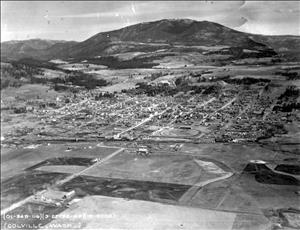On June 7, 1890, Colville, the county seat of Stevens County, is incorporated as a fourth-class town under the laws of the state of Washington. This is the second attempt at incorporation. The first, which occurs in June 1889 during the waning days of Washington Territory, is rescinded after the territory becomes a state on November 11, 1889. Colville has to apply anew for incorporation, and on January 22, 1908, becomes a third-class town. When this class is eliminated throughout the state in 1994, all such municipalities are simply designated towns.
Colville Before Colville
Colville’s origins predate incorporation or even platting. The frontier town of Pinkney City, which grew up beginning in 1859 to serve the garrison and surrounding area at military Fort Colville, was the forerunner of Colville. When Fort Colville closed in 1882, many residents, businesses, and even buildings of Pinkney City relocated to present Colville just over three miles south. Interestingly, Colville dates its origins to Pinkney City, not to the platting or incorporating of the town. As evidence, the townspeople celebrated the Colville centennial in 1959.
The main instigators of the first incorporation were a former soldier at Fort Colville, brewer and landowner, John U. Hofstetter (1829-1906), and attorney H. G. Kirkpatrick. When incorporation was granted by the district court, Hofstetter was elected chairman of the town council and is considered the father of Colville. The council took the oath of office and embarked upon its duties on June 14, 1889.
New Town, Old Debt
In February 1890, the State Supreme Court declared that the incorporation granted by the district court under Washington territorial law was null and void. The town immediately took steps to reincorporate under the new state laws. The petition was granted on June 7, and a new council convened its first session on June 12 with the following officers: A. A. Barnett, mayor; John U. Hofstetter, street commissioner; F. Wolff, town marshal; F. H. Fish, town clerk; H. G. Kirkpatrick, town attorney; and R. B. Thomas, engineer.
However, a problem arose immediately. The previous council had incurred debts, including $600 owed to the town marshal, A. A. Barnett. At first the new council was reluctant to honor these debts, even though A. A. Barnett was mayor! However, at its meeting of February 3, 1891, it voted to have the town attorney draft a memorial to the state legislature asking for legislation that would enable the new council to assume the debts of the previous one. Apparently the legislature failed to act, and M. M. Cowley (1841-1915) of the Traders’ National Bank of Spokane, which held some of the outstanding warrants, then took the matter to the State Supreme Court. The subsequent ruling declared that the debts were incurred in good faith by virtually the same organization and the new council was authorized to pay them.

